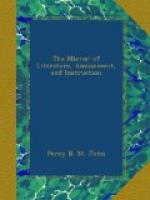—“Nae difference, Sir?”
“Then when you have put the water to the malt, go three times round the vat with the sun, and in pli’s name put in three shoolfu’s of malt; and when you have done that, go three times round the vat, against the sun, and, in the devil’s name, take out three bucketfuls of water; and take my word for it, the ale will be better.”
“Thanks to your reverence; gude mornin.”—Ibid.
* * * * *
THE GATHERER.
“A snapper-up of unconsidered
trifles.”
SHAKSPEARE.
* * * * *
SONG.
By Mr. Gay.
The sun was sunk beneath the hills,
The western clouds were lin’d
with gold,
The sky was clear, the winds were still,
The flocks were pent within
their fold:
When from the silence of the grove,
Poor Damon thus despair’d of love.
Who seeks to pluck the fragrant rose
From the bare rock, or oozy
beach,
Who from each barren weed that grows,
Expects the grape, or blushing
peach.
With equal faith may hope to find
The truth of love in woman-kind.
I have no herds, no fleecy care,
No fields that wave with golden
grain,
No meadows green, or gardens fair,
A damsel’s venal heart
to gain.
Then all in vain my sighs must prove,
For I, alas! have naught but love.
How wretched is the faithful youth,
Since women’s hearts are bought
and
sold,
They ask no vows of sacred truth,
Whene’er they sigh,
they sigh for gold.
Gold can the frowns of scorn remove,
But I, alas! have naught but love.
To buy the gems of India’s coast,
What gold, what treasure will
suffice,
Not all their fire can ever boast
The living lustre of her eyes.
For thee the world too cheap must prove,
But I, alas! have naught but love.
O Sylvia! since no gems, nor ore
Can with thy brighter charms
compare,
Consider that I proffer more
More seldom found, a heart
sincere.
Let treasure meaner beauty’s move,
Who pays thy worth, must pay in love.
* * * * *
MR. HOOD’S NEW SONGS.
The following “announcement” is so characteristic and amusing, that we copy it verbatim et literatim:—The author of “Whims and Oddities” has the honour of informing the public, that, encouraged by the popularity of the Ballads in the first and second series of that work, he intends to communicate a succession of similar vocal crotchets, to run alone without the help of an octavo. Sally Brown, Faithless Nelly Gray, and Mary’s Ghost, have been patronised by many public and private singers; but unfortunately they were adapted to as many airs—sometimes




